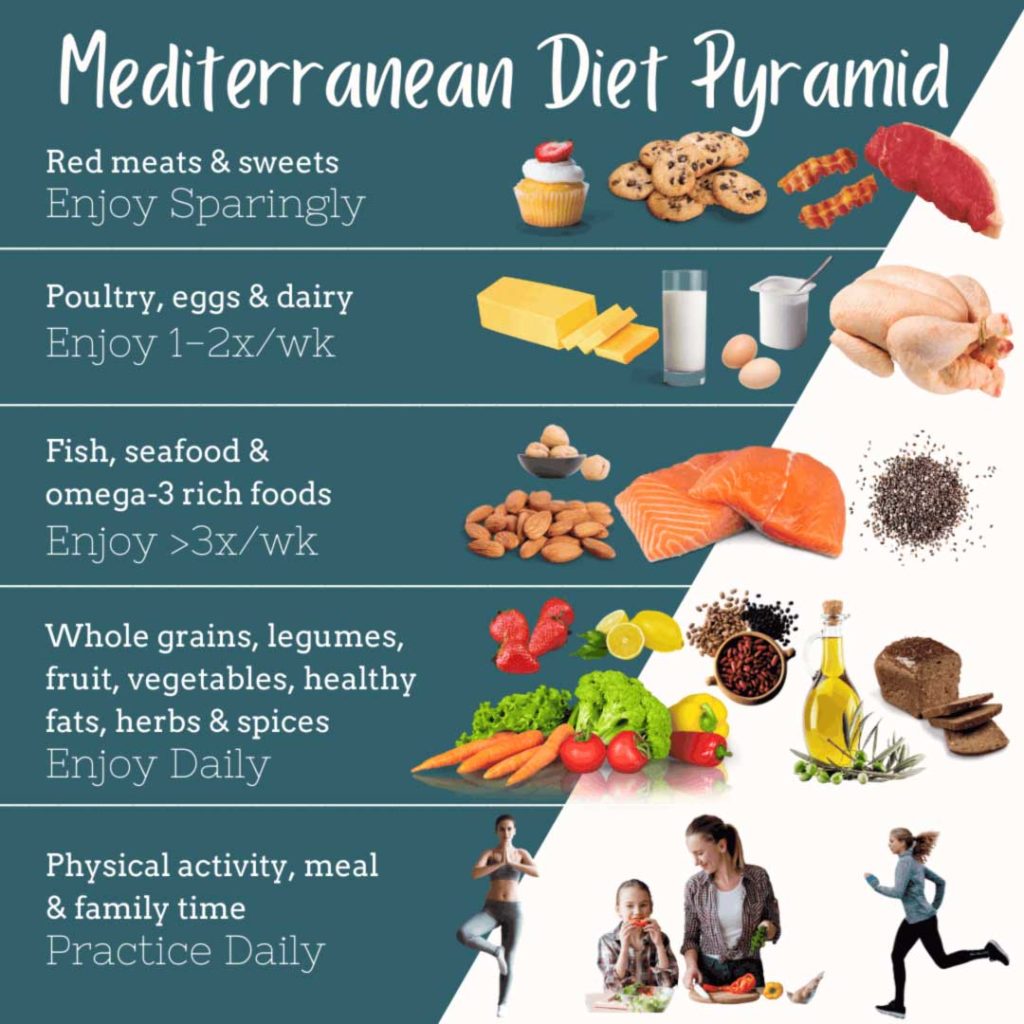A total diet and lifestyle approach continues to be one of the best prescriptions for a long, healthy life.
Critics tirelessly try to minimize all the trendiest new diets on the scene. But one diet that seems to have remained untouched – The Mediterranean Diet. Its benefits of weight loss and reduced likelihood to develop heart disease have been apparent for years.
The Mediterranean Diet dates back centuries. Now a recent study has once again confirmed that people who closely follow ‘the Mediterranean Diet’ are slimmer, healthier, and live longer than other Europeans. So what exactly is the Mediterranean diet and how does it have such a great lasting effect on health?
What is the Mediterranean Diet?
The Mediterranean diet is not a specific diet plan or diet program but a collection of eating habits that are traditionally followed by the people of the Mediterranean region – most commonly Greece, Southern Italy, and Spain. Mediterranean eating is based on components scientifically proven to reduce the risk of heart disease and lower cholesterol.
Characteristics of the Mediterranean Diet:
- A high consumption of fruits, vegetables, potatoes, beans, nuts, seeds, bread and other cereals
- Olive oil used for cooking and dressings
- Moderate amounts of fish but little meat
- Cheese and yogurt as the main dairy foods
- Fresh fruit as dessert
- Moderate amounts of fish and poultry
- Small amounts of red meat each week (compared to northern Europe)
- 25% to 35% of calorie intake consists of fat
- Saturated fat makes up no more than 8% of calorie intake
- Moderate consumption of wine, usually with meals
- Reliance on local, seasonal, fresh produce
- An active lifestyle
Despite its name, this diet is not typical of all Mediterranean cuisine. In Northern Italy, for instance, lard and butter are commonly used in cooking, and olive oil is reserved for dressing salads and cooked vegetables. In both North Africa and the Middle East, sheep’s tail fat and rendered butter (samna) are the traditional staple fats, with some exceptions. Therefore, the term ‘Mediterranean diet’ is more of a loosely held phrase, rather than scientific definition.
The most important aspect of this “diet,” is that it’s a model for how to eat healthy, lifelong.
How it works
Delicious food that’s stood the test of time and helps keep you healthy for years to come. That’s at the heart of the traditional Mediterranean diet.
Although there is no single, exact Mediterranean diet plan there are several books written to help interested dieters learn about Mediterranean foods, and lifestyle. In general, you’d be eating lots of fruits andvegetables, beans and nuts, healthy grains, fish, olive oil, small amounts of meat and dairy and red wine.
This lifestyle also encourages daily exercise, sharing meals with others, and enjoying it all.
Overall benefits may include weight loss, heart and brain health, cancer prevention, and diabetes prevention and control.
Does it work?
This diet scores big for heart health. Studies suggest it can make you less likely to get heart disease, lower your blood pressure and cholesterol, and may also help you avoid certain cancers and chronic diseases.
For weight loss, you’ll have better results if you stick with it more than six months, get regular exercise, and cut back on how much you eat. Studies show it may be better for weight loss than a low-fat diet.
What You Can Eat and What You Can’t
You’ll eat mostly plant-based foods, including fruits and vegetables, potatoes, whole-grain bread, beans, nuts, and seeds.
You can have yogurt, cheese, poultry, and eggs in small portions. You should eat fish and seafood at least twice a week. “Good” fats get a stamp of approval: Think olives, extra-virgin olive oil, nuts, sunflower seeds, and avocados instead of butter or margarine. You’ll use olive oil a lot while cooking. Reach for herbs and spices to add flavor.
Red wine gets a thumbs-up, in moderation (one or two glasses). And, quench your thirst with water rather than sodas.
Dessert is usually fruit. Sweets and red meats are OK occasionally.
Limitations are few – The Mediterranean diet allows plenty of variety and experimentation.
Does It Allow for Dietary Restrictions or Preferences?
Vegetarians and vegans: Sticking with fruits, veggies, whole grains, beans, nuts, and seeds is a snap for vegetarians. If you’re vegan, you’d need to skip the dairy products.
Low-sodium diet: You’ll rely on herbs and spices for flavor instead of salt, which helps if you’re looking for a low-sodium diet.
Low-fat diet: The Mediterranean diet doesn’t qualify as a low-fat diet. But it is low in saturated fat and is well within the American Heart Association’s guidelines.
Gluten-free? If you’re avoiding gluten, you can choose grains without gluten.
Ways to Follow the Mediterranean Diet
- Replace butter and margarine with healthy oils (such as olive oil) as often as possible.
- Switch up your proteins – Swap out most of your red meat and get your protein from skinless chicken and turkey, fish, beans, nuts and other plants.
- Eat veggies all day long, rather than only at dinner.
- Try whole-grain bread, pasta, rice and other grains, rather than processed.
- Snack on nuts, seeds or low-fat cheese instead of processed snack foods.
- Enjoy fruit for dessert.
- Drink on occasion, but in moderation.
- Set aside time to enjoy meals.
Recommendation
With its easy to follow guidelines, flexibility, and foods that are rich in flavor you can’t go wrong with the Mediterranean Diet. The studies speak for themselves – the Mediterranean Diet is a very healthy style of eating. Several foods recommended like olive oil, nuts, and avocados are very high in calories, so dieters need to pay attention to their portions. Overall, following these guidelines would help anyone live a healthier lifestyle, and stay fit. Not to mention the food choices are very tasty.
To learn more about the Mediterranean Diet, and see great recipes, start by clicking here.



Leave a Reply
You must be logged in to post a comment.